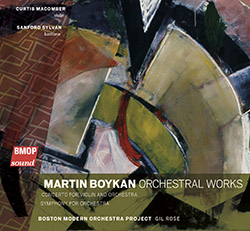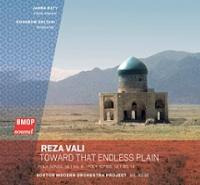CD Reviews — “Martin Boykan: Orchestral Works” and “Reza Vali: Toward That Endless Plain” (BMOP Sound)
Two new albums from BMOP Sound reflect the considerable artistry and vision of Gil Rose and the Boston Modern Orchestra Project.
By Jonathan Blumhofer.
For the Boston Modern Orchestra Project (BMOP), the 2012–13 season is ending much as it began: with strong playing, engaging programming, and more new releases from the orchestra’s in-house label, BMOP Sound. BMOP’s two most recent discs, Martin Boykan: Orchestral Works and Reza Vali: Toward That Endless Plain, straddle a big stylistic divide, yet both feature insightful playing and leadership from Gil Rose and a roster of impressive soloists.
Martin Boykan is probably best known locally from his long tenure on the faculty at Brandeis University (he retired in 2007). He studied with the who’s who of mid-twentieth-century composers, including Aaron Copland, Walter Piston, and Paul Hindemith, and his music often sounds like the best of all three: rigorous and focused, yet expressive. On the present disc, there are hints (sometimes more than hints) of Schoenberg and Berg in both pieces, the Violin Concerto and Symphony for Orchestra. What impresses most, though, about Boykan’s compositional technique is the absolute mastery of the Schoenberg system and its synthesis into his distinctive voice. There’s plenty of bad atonal music out there (and even more bad tonal music), but this isn’t that: like Leon Kirchner’s, Boykan’s music tends to compel the ear and offer meaningful rewards to the listener.
On this album, the 2003 Violin Concerto gets a blistering performance from Curtis Macomber, its dedicatee. Cast in three mostly brooding movements, it’s a serious piece that calls to mind the Schoenberg concerto and Heifetz’s dis about the soloist needing a sixth finger to manage their part. No matter: Macomber never sounds too troubled by the technical demands, and he manages some sweet, lyrical playing in between the gnarly bits. It’s tough music, all the same, unrelenting at times in its cragginess. Such difficulties can bring their own rewards, though, and repeated listening reveals greater depth in this enigmatic score.
Boykan’s Symphony for Orchestra (1989), succeeds rather more easily on first hearing, though it’s not necessarily less complex, harmonically. It falls into four movements: the first a long, melancholy essay; the second, a big scherzo of Beethovenian proportions; the third, a luminous (but brief) Adagio; and the finale, a setting of Keats’s sonnet “To Sleep.” The magnificent Sanford Sylvan delivers an fervid account of the latter, while Rose draws playing of great flexibility from BMOP throughout: listen, for instance, to the contrast between the lyricism of the slow movements and the mighty apex of the scherzo. Both examples showcase just what a fine ensemble BMOP is and demonstrate Boykan’s formidable abilities as a composer. If you’re not familiar with Boykan’s output, there’s no better way to introduce yourself to it than through this album.
*******
Reza Vali was born in Iran. And, though he’s now based in Pittsburgh, much of his musical language draws on Iranian folk music, both real and imagined. It’s probably inevitable that any composer who deals so heavily with folk music be compared to Bartók, and, indeed, Vali acknowledges the latter as a formative influence. But like Boykan, Vali is a composer who’s created a unique voice with his source materials and that’s the primary impression one takes away from Toward That Endless Plain, an ingratiating album of music both original and arranged.
Throughout his career, Vali has composed a series of folk song sets, most of which are vocal though some are purely instrumental. Some are also “invented” folk songs—original music (and words) that evoke the real thing. The two folk song sets on this release, nos. 8 and 14, respectively, are vocal and feature a skillful mix of authentic and fake folk tunes. Not that one can really tell the difference. Soprano Janna Baty gleefully inhabits all of them, from the anguished laments of set no. 8 and the swooning “Mountain Lullaby” of no. 14 (whose scoring calls to mind moments from Bernstein’s A Quiet Place) to the Khachaturian-esque “Song from Azerbaijan.” It’s hard to imagine a better singer in this repertoire not named Cathy Berberian or Dawn Upshaw.
The title track is the most substantial piece on the album. Written for Persian ney, a type of reed flute common to the Middle Eastern music that utilizes a non-tempered scale, Toward That Endless Plain is inspired by a poem by the twelfth-century, Persian mystic Sohrab Sepheri that traces a journey from conflict to “peace and enlightenment.” Khosrow Soltani, the work’s dedicatee, manages the solo part with great sensitivity and understanding, though it takes some time to adjust the ears to the clash between Western and Persian tuning systems.
Throughout the disc, Rose draws playing of wildly brilliant colors and idiomatic spirit from BMOP. This is an orchestra as versatile as any, as they show again and again, and this album is a triumph on all counts.
Tagged: >Martin Boykan: Orchestral Works, BMOP, Boston Modern Orchestra Project


